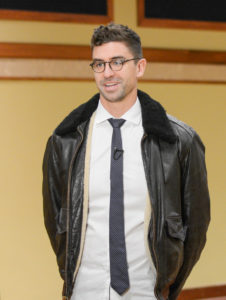By Emily Williams, Assistant Features Editor

Most people wouldn’t expect a three time Olympic gold medalist and former world record holder to advocate the idea that success isn’t everything. But that is exactly the message that Anthony Ervin, American competition swimmer, proclaimed to a crowd of students, faculty and staff at Murray State on Feb. 27 in the Curris Center ballroom.
The event was sponsored by Murray State’s Student Government Association (SGA), and Nathan Payne — executive vice president of SGA — said they wanted to bring a distinguished speaker such as Ervin to campus to speak this year, not just hold a concert or something similar as they have done in past years.
“We thought it would be a great opportunity to showcase someone who was very important,” Payne said. “Anthony’s story really stuck out to us.”
Payne said he thought it was beneficial for students to hear Ervin speak about some of the same issues they may be trying to overcome in their own lives.
Ervin said at the beginning of his career he relied on being a fast swimmer for his self-esteem and sense of worth. He said this put a lot of pressure on him and affected his ability to perform well.
“You started to feel validated and important if you did well,” Ervin said. “You wanted to be good at this because you wanted other people to like you.”
He said it wasn’t until he really began to feel the burden of not measuring up that he remembered it wasn’t about competing so much as where it all began: the love of the water.
“It was about the play,” He said. “That’s where it started and that’s where it remained.”
Through many peaks and valleys, Ervin earned his first gold medal in the 2000 Summer Olympic Games in Sydney, Australia in the 50 meter freestyle. At the young age of 22, Ervin stopped swimming competitively and went through one of the darkest, most self-destructive times in his life. Although he pursued higher education and earned a degree in English at the University of California, Berkeley, he also began abusing drugs, alcohol and battling depression. The swimmer also has Tourette’s syndrome and said that has been a roadblock that has been hard to overcome. These things defined Ervin’s life until getting back on track and beginning to train again in 2011. During the 2016 Summer Olympic Games in Rio De Janeiro, Brazil, Ervin won his second gold medal in the event. The swimmer has also earned two world championships and seven NCAA titles.
“The big takeaway from, at least from any achievement I have made or any success, is that I did not do any of it alone,” Ervin said. “If I reach great peaks, there are also great valleys I had to contend with. The people that were there for those were with me at the end as well.”
Ervin said he had a new goal in mind his third time around in the Olympics.
“I just wanted to be the best version of me,” he said. “How people respond to that is completely out of my control. No matter what, I wasn’t going to let what somebody else was doing get to me. I knew who it was that I wanted to succeed for now. It was the people who cared about me the most.”
According to swimswam.com, Ervin donated the gold medal he earned at the Sydney games to the Red Cross Tsunami relief fund. He sold the medal on eBay to a swim fan in the Philippines and raised over $17,000 for the organization. He is also the oldest Olympic competing swimmer in the U.S. to date.
Michelle Blanchett, junior from Henderson, Kentucky, said she came to the event because it was required for an assignment in a class, but that she really enjoyed it.
“I really liked how animated he was,” Blanchett said. “I loved his attitude and it was very comforting to listen to him. You could really relate to him.”
Ervin ended the night by emphasizing the fact that even with the amount of success he has had, he has experienced far more losses than wins in his career and his life. He believes it is all about community and said we cannot do this alone.
“Things rarely end up the way you think they will,” He said. “We’re all just a bunch of people trying to get somewhere. When things start going south in your life, you need those loyal people. I didn’t do any of this on my own.”